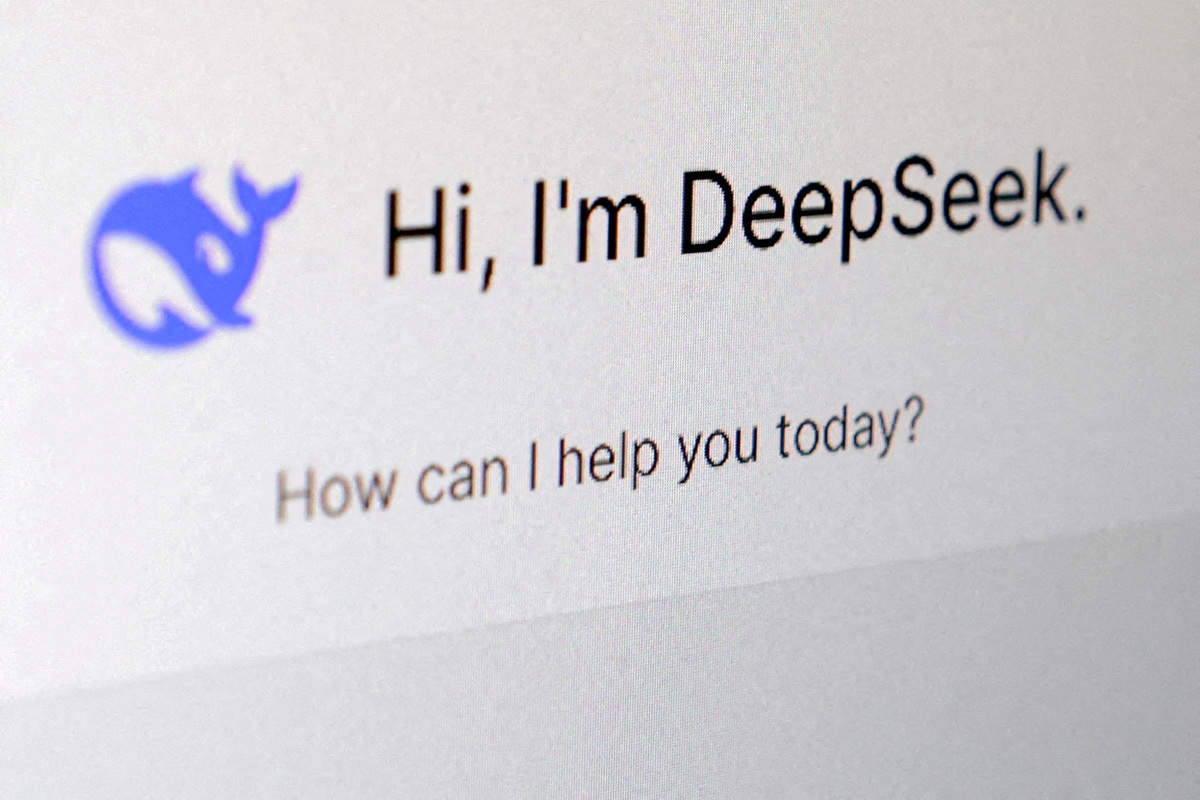
The DeepSeek app is seen in this illustration taken on Jan 29, 2025. [Photo/Agencies]
A new wave of artificial intelligence innovation is accelerating China's industrial transformation. Companies such as DeepSeek have been making headlines across multiple sectors, which are eager to harness the potential of the latest generative artificial intelligence.
Experts said Hangzhou-based AI startup DeepSeek and other Chinese AI companies are expected to inject new vitality into industrial development by fostering synergy between technology and production and, in turn, help improve the level of technology used in manufacturing and other industries.
With its influence beginning to be felt through AI supply chains, DeepSeek has moved from relative obscurity to the forefront of the global tech arena with its powerful and cost-effective models — most notably the DeepSeek-R1, a large language model released last month. Developed at a fraction of the cost incurred by its Western counterparts, it has stunned Silicon Valley, which is deemed the world's most advanced AI powerhouse.
In just one month, every link in the AI industry chain — from hardware suppliers to software developers to end users — has rapidly shifted, leading to far-reaching industrial transformation, with domestic tech companies such as Alibaba and Huawei announcing the adoption of DeepSeek's model.
"DeepSeek has made new optimizations and introduced fresh ideas in its large model technology, specifically tailored for certain applications," Xiang Ligang, director-general of the Information Consumption Alliance, a Beijing-based telecom industry association, told China Daily.
"As a result, it reduces hardware requirements, making it more efficient and accessible, bringing new opportunities for applications across diverse areas," Xiang added.
One area embracing the trend is cloud services, where providers such as Tencent and Baidu have integrated the DeepSeek model.
It has also sparked a wave of interest in the financial sector, with banks, insurance companies and securities firms accelerating the localized deployment of DeepSeek's models.
"Predictive analytics models can help financial institutions make better investment decisions by enabling more accurate risk assessment and fraud detection," Mehmood Ul Hassan Khan, president of the Pak-China Corridor of Knowledge and executive director of the Center for South Asia and International Studies in Islamabad, said.
"Through AI-powered chatbots and virtual assistants, it enhances customer interactions," Khan added, noting other application scenarios such as education, health and manufacturing processes.
Automakers, including giants such as BYD and Geely, are also on board, embedding DeepSeek into smart cabins, voice systems and broader AI-driven operations.
"DeepSeek's open-source nature could popularize AI, boosting industrial adoption and market demand. Thus, it could become infrastructure in AI, aligning hardware and software, and spurring new quality productive forces," said Xiang of the Information Consumption Alliance.
New quality productive forces, characterized by high-tech, high efficiency and high quality, refer to advanced productivity freed from the traditional economic growth mode and productivity.
"Through industry-specific data and knowledge, users can conduct fine-tuning, enabling AI to be widely applied across diverse sectors," Xiang said.
This industrial integration momentum is spilling over into everyday life as the number of generative AI product users in China reached 249 million in 2024, according to a statistical report published in mid-January by China Internet Network Information Center.
The report said that in China, the development of generative AI-related industries has shown initial results. Through proactive policy guidance and continuous efforts by companies, generative AI has been widely applied in content creation, business operations, tech research, industrial production, and many other fields, it said.
"The widespread application of AI is a prevailing trend," Sun Yutao, professor at Dalian University of Technology's School of Economics and Management, said.
"Further stages of AI application go beyond information. For example, advances in robotics and autonomous driving involve more than equipment automation," Sun added.
The number of AI companies in China has surpassed 4,500, with the value of the core sector reaching nearly 600 billion yuan ($83 billion) as of June 2024, according to the Ministry of Industry and Information Technology of China.
Beyond China's borders, DeepSeek's influence is gaining traction. Global giants such as Amazon and Microsoft have rushed to integrate its capabilities, while developing nations are also seizing the opportunity.
India's AI startup Krutrim has announced the deployment of the DeepSeek-R1 reasoning model on Indian servers, BW BusinessWorld reported. Meanwhile, the emergence of new player DeepSeek is transforming Latin America's AI future, reported Americas Quarterly last week.
"AI models like DeepSeek have helped bridge the global digital divide, offering opportunities for developing and underdeveloped countries," said Khan of the Pak-China Corridor of Knowledge.
"This advancement is a positive sign for their economies, industries and societies, guiding them toward greater digitalization," Khan added.